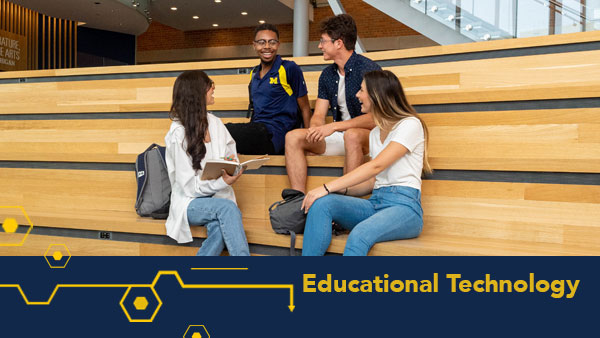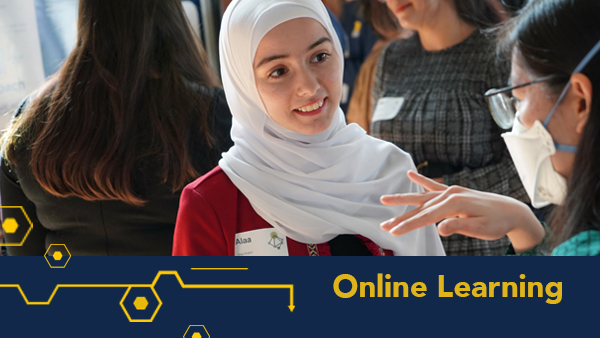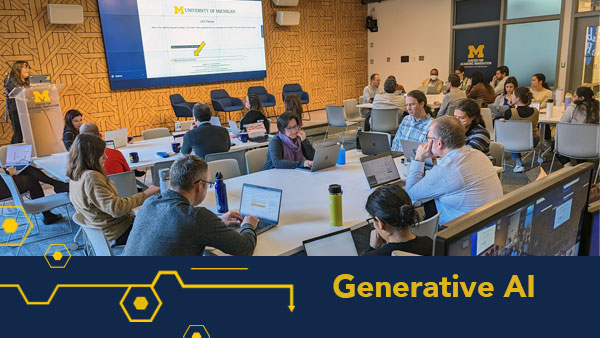Behavioral science, Teach-Outs, learning within a pandemic, extended reality are some of the most-read issues in 2021
Sean Corp, Content Strategist
The end of the year is a time for reflection, and looking back at all the work, insight and innovation produced by the Center for Academic Innovation, you quickly realize just how varied the work is that happens under the center’s various roofs, and that the mix of expertise brought by faculty partners, industry leaders and the center’s own staff is unmatched.
I decided that with 2021 coming to a close, it would be a great time to round up the most-read items found on the center’s story feed. One important caveat, though. These are not necessarily stories written in 2021, they are just the most popular stories to readers in 2021. Why is that important? Because as much as the center is always producing new content, promoting new course launches and conducting new research, there is also plenty of great material in the archives that readers find on important topics of research, pedagogy and data analysis.
Let’s get to our list.
Are you a student disrupted by coronavirus and feeling unmotivated? We have five ideas
This piece by the center’s behavioral science team was released in March 2020 as the pandemic was just taking hold and students and faculty in higher education were asking and answering difficult questions about how to stay engaged in a situation never experienced before that would be highly disruptive. The piece outlines five strategies for students to engage in and also includes a study guide on adjusting study habits during COVID.
“Your life has simultaneously been turned upside and gone very quiet in a matter of days. Social distancing and lack of toilet paper are new for everyone, and none of us has it all figured out yet. It’s normal for all this change to lead to distraction and demotivation.
Even when things feel out of control, there might be a few things you can control to make it better. The key is to find your own best way to handle the Right Now. The rest will come when it comes.”
Bringing Behavioral Science to Teaching and Learning Innovation
Another win for the behavioral science team. Whereas the first entry was an article borne out of the moment, this is a timeless look at behavioral science as a field and how it can be utilized in education in the style of a Q&A.
“Behind every good learner is good behavior.
We continue to learn that much of the success students and online learners experience comes from choosing the right behaviors, but that doesn’t make choosing easy. That’s why the Office of Academic Innovation is dedicated to integrating behavioral science principles into teaching and learning. Amy Homkes-Hayes, Lead Innovation Advocate, sat down with Holly Derry, Associate Director of Behavioral Science, to explore how she and her team support Academic Innovation’s portfolio of work including educational technology software, MOOCs, and more.”
Combatting Disinformation with The Four D’s
This piece highlights one of the many Teach-Outs held in 2021 and provides insight from disinformation expert Ben Nimmo, a renowned expert on the field of disinformation and contributed to the Disinformation, Misinformation, and Fake News Teach-Out. In this piece, Nimmo’s work is highlighted, including his “Four Ds of Disinformation, which is designed to help people anticipate, spot, and react to disinformation from potential “threat actors.”
“The Disinformation, Misinformation, and Fake News Teach-Out helps people understand the difference between disinformation, misinformation, and fake news. Participants will better be able to understand the types of disinformation and how it is transmitted and received. They will also learn how to evaluate their own media consumption habits and combat disinformation in their everyday lives.”
Epic MegaGrant From Epic Games Will Support Development of XR projects Using Unreal Engine
The XR Initiative, housed within the Center for Academic Innovation, works with faculty and industry partners to help explore and redefine the future of extended reality technologies in teaching and learning. In 2021, the XR Initiative received an Epic MegaGrant from industry leader Epic Games. The grant is used to fund student fellows to contribute to the development of XR projects.
“The MegaGrant will be used to fund XR student fellows for the next two years and help educate them in different tools and processes like Unreal Engine, a game engine developed by the company Epic Games. The XR team plans on hiring around 20 to 30 student fellows to contribute to different projects and help in areas such as building out storyboards, writing code, and creating 3D models for the XR projects we fund, according to Nelson.”
U-M students have free access to entire Coursera catalog featuring courses from top university, industry partners
It’s also never a bad time to remind University of Michigan students, faculty and staff from all three campuses that they have free access to not only the entire University of Michigan-developed catalog of courses, but also thousands of other opportunities from other Coursera partners.
This piece outlines the first phase of that program called the Coursera for Campus initiative.



